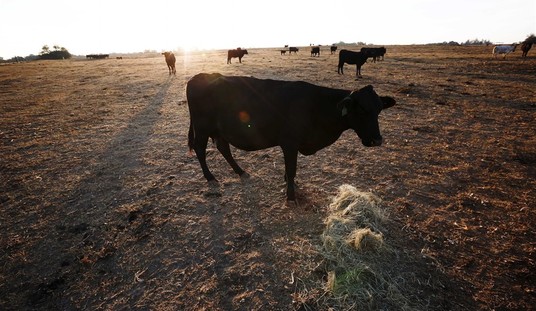This one’s a 10.0 on the Roberts anxiety meter. It’s widely understood (well, assumed) that the chief frets over the Court being seen as a collection of predictable partisan hacks. That fear *may* have informed his alleged decision to switch his vote from striking down ObamaCare when that case was before him in 2012 to upholding the law on the dubious theory that the individual mandate is actually a lawful tax for constitutional purposes. He didn’t want the public to see a five-vote conservative majority blow up Obama’s signature legislation, knowing how that would lend itself to the suspicion that the justices are voting based on politics, not law. So he switched.
Or so the theory goes.
If the Court takes this new appeal from Trump, he’ll have another legal question to settle that’s been electrified by partisan interest. Except this time the case involves a president who famously craves loyalty from his allies and who’s taken to dismissing unfavorable rulings in federal court as the product of “Obama judges,” a term which Roberts has criticized publicly. If he ends up as the fifth vote to bar prosecutors in New York from obtaining Trump’s tax returns as part of an investigation into possible campaign finance violations, the left will destroy him as a GOP hack after all, a coward who was intimidated by Trump into abetting his effort to obstruct justice.
Whereas if he’s the fifth vote to let prosecutors obtain the returns, the right will destroy him as a weak-willed squish, the new Kennedy, bullied yet again by liberal criticism into screwing Republicans. It’ll be another reminder that Roberts, by supposedly worrying so much over how the Court is perceived, has allowed himself to become the very sort of politically minded justice that he wants the public to believe doesn’t exist.
All of that would be enough to make this a 9.5 on his anxiety meter. What gets it to 10 is that if the Court agrees to take the case now, the ruling should come down in the summer of 2020 — months before the election. Trump’s political enemies would at last have their hands on the holy grail, the financial records that he’s battled for years to keep people from seeing. If the tax returns leak, what’s in them could conceivably upend the election. And John Roberts would have made it all possible. He’ll be the new Comey, the lawman who strove to stay out of politics and somehow ended up all but deciding the election.
Anyway, fun times.
Mr. Trump has fought vigorously to shield his financial records, and prosecutors in Manhattan have agreed not to seek the tax returns until the case is resolved by the Supreme Court. In exchange, they insisted on a very quick briefing schedule, one that would allow the Supreme Court to announce whether it will hear the case as soon as next month and to issue a decision by June, as the presidential election enters its final stages…
The prosecutors are looking into hush-money payments made to two women just before the 2016 presidential election. Mr. Trump and his company, the Trump Organization, reimbursed his former lawyer and fixer, Michael D. Cohen, for payments he made to the adult film actress Stormy Daniels, who claimed she had an affair with Mr. Trump…
Mr. Trump’s lawyers sued to block the subpoena [from prosecutors], arguing that criminal investigations of presidents are barred by the Constitution. They said sitting presidents are not only protected from being indicted, a proposition that is widely but not universally accepted, but also cannot be subjected to the burdens of criminal investigations, especially from local prosecutors who may use the criminal process for political gain.
That would be … quite a ruling by SCOTUS. Not only can’t the president be prosecuted while in office, he can’t even be investigated. One of the appellate judges asked Trump’s lawyer during oral arguments whether that would mean the NYPD would be obliged not to look into it if Trump did in fact shoot someone on Fifth Avenue, as Trump once joked about. Yup, said Trump’s lawyer. That’s what it would mean. Presidential murder sprees would presumably be completely hands-off zones for authorities unless and until Congress removed Trump from office, ending his legal immunity. Which is alarming, especially given Republican arguments lately that impeachment is inappropriate since it undermines the people’s authority to decide who should be president.
If you’re stuck arguing in court that your client is essentially entitled to engage in “The Purge” while he’s in office and that cops can’t even look into it, I feel like the odds are against you.
This isn’t the only case floating around in the courts involving Trump’s tax returns. The D.C. Circuit ruled last month that the House Oversight Committee is constitutionally entitled to obtain his financial records as part of its impeachment inquiry. There was some dispute over whether the relevant federal statute authorizes that: It says Congress can see those records if it has a “legislative” purpose, which may or may not include impeachment depending upon how one defines the term. Just yesterday the D.C. Circuit denied a rehearing on that ruling, which means the Supreme Court is now the next stop on that matter too. I assume that if SCOTUS agrees to hear Trump’s case against New York prosecutors in the campaign finance matter, it’ll also agree to hear his case in the impeachment matter. (Although one expects impeachment will have long since ended by the time a ruling is issued, raising the risk that that appeal will be deemed moot.) If they’re going to go to the trouble of deciding when criminal prosecutors are entitled to obtain the president’s personal records, one would think they’d take the opportunity to clarify whether the quasi-criminal impeachment process creates authority to do so as well.
Honestly, it’s hard to see him winning both cases. The New York case in particular doesn’t directly interfere with Trump’s official duties, a concern the courts have considered when Richard Nixon and Bill Clinton were subpoenaed, since it’s his accountant that’s being subepoenaed, not Trump himself. And the Second Circuit noted in its ruling that the mere fact of disclosing one’s tax returns hasn’t been such a burden on previous presidents that it should create any special difficulty for Trump. Essentially SCOTUS really would need to rule that presidents are immune from investigation during their term in office, full stop, to hand him a win here. The Court will not naturally incline to a rule that sweeping, even though the conservative majority will probably be sympathetic to executive immunity.
The only recourse for Trump might be to send Keith Schiller and a goon squad into his accountant’s office to “take possession” of those records before they can be turned over. But he wouldn’t do that, would he?
One prediction: I would guess that Trump’s lawyers will argue that Ruth Bader Ginsburg should recuse herself from the case given her comments in July 2016. “He really has an ego. … How has he gotten away with not turning over his tax returns? The press seems to be very gentle with him on that,” she said. Interestingly, Ginsburg herself acknowledged later that she crossed the line, saying the next day, “On reflection, my recent remarks in response to press inquiries were ill-advised and I regret making them. Judges should avoid commenting on a candidate for public office. In the future I will be more circumspect.” If she agrees that her remarks were improper, should she step away from a case involving his tax returns? Imagine the Court deadlocking 4-4 on a topic this charged. Although it would be bad news for Trump if they did: In that case, the unfavorable lower court rulings against him would stand.








